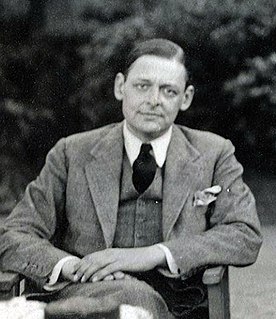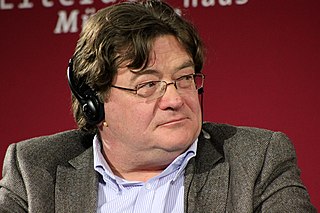Related Research Articles

Thomas Stearns Eliot was a poet, essayist, publisher, playwright, and literary and social critic. Born in St. Louis, Missouri, to a prominent Boston Brahmin family, he moved to England in 1914 at the age of 25 and went on to settle, work and marry there. He became a British subject in 1927 at the age of 39, subsequently renouncing his American citizenship.

Robert Herrick was a 17th-century English lyric poet and cleric. He is best known for Hesperides, a book of poems. This includes the carpe diem poem "To the Virgins, to Make Much of Time", with the first line "Gather ye rosebuds while ye may".

"The Love Song of J. Alfred Prufrock", commonly known as "Prufrock", is the first professionally published poem by American-born British poet T. S. Eliot (1888–1965). Eliot began writing "Prufrock" in February 1910, and it was first published in the June 1915 issue of Poetry: A Magazine of Verse at the instigation of Ezra Pound (1885–1972). It was later printed as part of a twelve-poem pamphlet titled Prufrock and Other Observations in 1917. At the time of its publication, Prufrock was considered outlandish, but is now seen as heralding a paradigmatic cultural shift from late 19th-century Romantic verse and Georgian lyrics to Modernism.

Donald Paterson is a Scottish poet, writer and musician.

George Granville Barker was an English poet, identified with the New Apocalyptics movement, which reacted against 1930s realism with mythical and surrealistic themes. His long liaison with Elizabeth Smart was the subject of her cult-novel By Grand Central Station I Sat Down and Wept.
Craig Anthony Raine, FRSL is an English contemporary poet. Along with Christopher Reid, he is the best-known exponent of Martian poetry, a movement that expresses alienation with the world, society and objects, sometimes to a metaphysical degree, but tending towards being simplistic. He was a fellow of New College, Oxford from 1991 to 2010 and is now emeritus professor. He has been the editor of Areté since 1999.
Sir Herbert Edward Read, was an English art historian, poet, literary critic and philosopher, best known for numerous books on art, which included influential volumes on the role of art in education. Read was co-founder of the Institute of Contemporary Arts. As well as being a prominent English anarchist, he was one of the earliest English writers to take notice of existentialism. He was co-editor with Michael Fordham of the British edition in English of The Collected Works of C. G. Jung.

Journey of the Magi is a 43-line poem written in 1927 by T. S. Eliot (1888–1965). It is one of five poems that Eliot contributed for a series of 38 pamphlets by several authors collectively titled Ariel poems and released by British publishing house Faber and Gwyer. Published in August 1927, "Journey of the Magi" was the eighth in the series and was accompanied by illustrations drawn by American-born avant garde artist Edward McKnight Kauffer (1890–1954). The poems, including "Journey of the Magi", were later published in both editions of Eliot's collected poems in 1936 and 1963.

George Sutherland Fraser was a Scottish poet, literary critic and academic.

Thomas Ernest Hulme was an English critic and poet who, through his writings on art, literature and politics, had a notable influence upon modernism. He was an aesthetic philosopher and the 'father of imagism'.

Sir John Frank Kermode, FBA was a British literary critic best known for his 1967 work The Sense of an Ending: Studies in the Theory of Fiction and for his extensive book-reviewing and editing.
Professor John Haffenden FBA FRSL is Emeritus Professor of English Literature at the University of Sheffield.
Sir Herbert John Clifford Grierson was a Scottish literary scholar, editor, and literary critic.

John Burnside is a Scottish writer, born in Dunfermline. He is one of only three poets to have won both the T. S. Eliot Prize and the Forward Poetry Prize for the same book.
Bernard O'Donoghue FRSL is a contemporary Irish poet and academic.
T. S. Eliot's Ariel poems are those written for Faber and Faber's series of Ariel Poems. All but "Triumphal March" also appear in his book Collected Poems: 1909–1962 under the heading Ariel Poems.

The Waste Land is a poem by T. S. Eliot, widely regarded as one of the most important poems of the 20th century and a central work of modernist poetry. Published in 1922, the 434-line poem first appeared in the United Kingdom in the October issue of Eliot's The Criterion and in the United States in the November issue of The Dial. It was published in book form in December 1922. Among its famous phrases are "April is the cruellest month", "I will show you fear in a handful of dust", and the mantra in the Sanskrit language "Shantih shantih shantih".
Dissociation of sensibility is a literary term first used by T. S. Eliot in his essay “The Metaphysical Poets”. It refers to the way in which intellectual thought was separated from the experience of feeling in seventeenth century poetry.

The T. S. Eliot bibliography contains a list of works by T. S. Eliot.

"A Song for Simeon" is a 37-line poem written in 1928 by American-English poet T. S. Eliot (1888–1965). It is one of five poems that Eliot contributed to the Ariel poems series of 38 pamphlets by several authors published by Faber and Gwyer. "A Song for Simeon" was the sixteenth in the series and included an illustration by avant garde artist Edward McKnight Kauffer. The poems, including "A Song for Simeon", were later published in both the 1936 and 1963 editions of Eliot's collected poems.
References
- ↑ "George Williamson 1898-1968" by J. R. Bennett and Blair Rouse, Style , Vol. 2, No. 3 (Fall 1968).
- ↑ Eliot, Valerie & John Haffendon. (Eds.) (2012). The Letters of T. S. Eliot Volume 3: 1926-1927. London: Faber & Faber. p. 301. ISBN 978-0-571-27964-7.CS1 maint: extra text: authors list (link)
- ↑ "A List of George Williamson's Books" by Gwin J. Kolb, Modern Philology , Vol. 61, No. 3 (Feb., 1964), pp. 238-239.
| This biography of an American English academic is a stub. You can help Wikipedia by expanding it. |